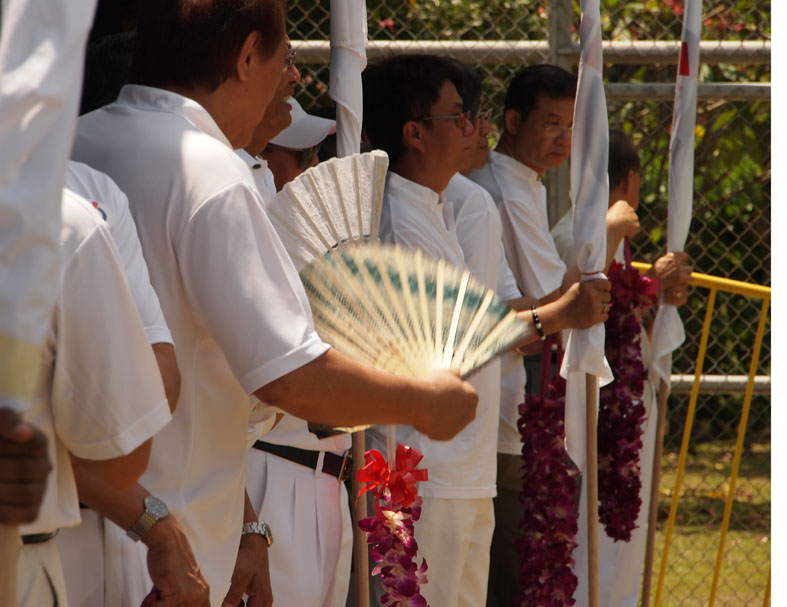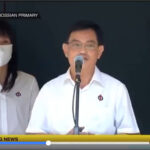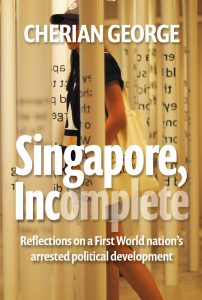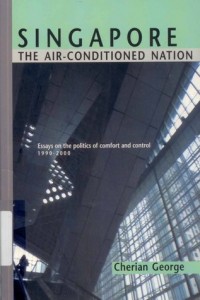WHAT WOULD MAKE ME A FAN
Now that the public is more assertive, it wouldn’t hurt to think about what exactly we expect from the PAP. Here’s my own wish list.
For most of 2012, Punggol made national news mainly as a showcase for the government’s prowess in public housing. There were international accolades for the Punggol Waterway district and a healthy buzz around the recently completed Treelodge@Punggol, touted as HDB’s first build-to-order eco-project.
Since mid-December, though, any Google News search, keyword punggol, would yield a more scandalous set of headlines, attesting to the PAP’s human frailty. The town’s impressive development plans are still on track. But as much as government technocrats love being left alone to tinker with their policies, they must now contend with the prospect of a high-risk by-election in the Punggol East constituency.
In that sense, the news from the Northeast was not as much of a shocker as it’s been made out to be. Sure, it was the first time the ruling party lost an MP in mid-term to an extra-marital tryst. But the episode was in keeping with the larger narrative of Singapore politics since the 2011 general election: A government of formidable capability is repeatedly forced on the defensive by a public with a penchant for picking at its flaws.
Indeed, the new default mode in Singapore politics is finding fault with the ruling party. This is not necessarily a bad thing, since the best defence against bad government is ultimately a vigilant citizenry. And in some respects, those in charge have deserved the criticism they’ve received. But, it must seem to the PAP as if there’s no policy so sound nor statement so sweet that it won’t be spat at by some section of the public.
Naturally, the abuse is fiercest from the significant minority of diehard opposition supporters who’ve come to the conclusion that Singapore would be better off if the PAP lost power. One would think that they’d be neutralised by the PAP’s own loyalists who don’t want the party to deviate too much from its traditional course – but then these supporters are rather more timid than their opponents.
At these two ends of the political spectrum, party allegiance is inelastic: attitudes towards the PAP are relatively fixed regardless of what it does. Discounting both extremes, what is more interesting is the response of the large middle ground of Singaporeans, whose support for the PAP and its policies is conditional. Such citizens set the tone for Singapore’s political culture and will determine electoral outcomes.
These Singaporeans seem to be waiting to see how the PAP responds to last year’s electoral setbacks. They can be tough customers, turning over every new government initiative with the piercing eye and sharp tongue of an auntie examining fish at a market stall run by a chap who hasn’t yet won her trust, despite his insistence that it’s all fresh and cheap.
To help her make up her own mind, she applies a mental checklist – price, springiness of flesh, redness of gills, clarity of eyes (of the fish, not the seller). The savvy shopper protects herself with a shield of skepticism, but remains open minded to the possibility that this stall may really offer the best deals in the market. If she overdid her negativity, she’d never go home with any fish.
As citizens, similarly, we might cheat ourselves of good government if our cynicism is so automatic and unthinking that we fail to support moves that are, on close inspection, in our own enlightened self-interest. Instead, we need an attitude of rational and reasoned skepticism, judging the PAP’s actions against yardsticks that we have taken the time to think through.
Such homework was less important when the PAP’s monopoly on power was as taken for granted as the fact that our MRT trains would run smoothly. Regardless of what its passengers thought, the PAP behemoth would trundle along its chosen track. Since the last election, though, PAP dominance no longer looks like a sure thing. Now, the course of Singapore politics will depend on whether people are convinced by the PAP’s internal reforms, or decide that it’s time to give another team the chance to lead.
Reforms I’d like to see
There is no universal checklist for this – it’s not like buying fish – which makes it all the more important that we make up our own minds about what exactly would satisfy us.
I’ve been mulling over this question for a while, asking myself what it would take for the PAP to win me over so completely that I would not only vote for the party but also count myself as an enthusiastic and vocal supporter. The answers I’ve arrived at may not resonate with many others, but I’m satisfied that they are consonant with my own values as a citizen.
First, I want leaders who think they know best – but are equally certain that they don’t know it all. Politicians shouldn’t run for office if they aren’t convinced they can do the job better than anyone else. But, a wise leader accepts that he might be wrong on any given decision, no matter how sincere and well intentioned he is.
So, I’d want to see the PAP going beyond platitudes about consultation and conversation. It needs to not just tolerate alternative views on a case-by-case basis, but also protect with passion the space for dissent. If it uses its power to silence criticism deemed to be unconstructive, this would indicate the hubris of a team that has deluded itself that it can escape the grip of groupthink without the check of fearless external critics.
I would tick off this box on my checklist if the PAP instituted such reforms as: creating an Ombudsman’s office; introducing open government reforms, including on the right to information; encouraging our universities to adopt guarantees of academic freedom; and taking a stand against the politics of fear, by abandoning the use of defamation suits to settle political debates and declaring a moratorium on the use of detention without trial against peaceful political opponents.
Second, I’d expect to see the PAP permitting opponents to challenge its political power on a level playing field. Top of the to-do list must be an independent election commission, such that the process of drawing electoral boundaries would be insulated from the executive branch. The national broadcaster should move towards the BBC model, with a charter requiring it to be scrupulously impartial in its coverage of politics.
A fairer system could cause the PAP to win fewer seats – but this setback would be more than compensated for by the extra legitimacy it would gain from winning those seats fair and square. After all, whatever problems the PAP currently faces in capturing hearts and minds are hardly due to the fact that it now faces four more Opposition MPs in Parliament. It is the shortage of competition, not its excess, that has made so many Singaporeans cynical.
Third, I’d like the PAP to stand up for what’s right, even if this places it a few steps ahead of the majority of Singaporeans. Already, the PAP prides itself in staying focussed on Singapore’s long-term interests even at the cost of short term popularity. However, on certain issues of principle, it has not exercised sufficient moral leadership, because it claims that the masses are not ready to follow.
I’d like to see it blazing a trail to the moral high ground, and then using its clout to pull Singaporeans up there with it. It could be more conscientious in fighting greenhouse gas emissions, and as generous as other small, wealthy countries in alleviating suffering in the world. I suspect that if it acted more idealistically, the PAP would attract many more young Singaporeans, who crave something to believe in.
Above all, though, I would want it to uphold the principle of equality. It should be defending the right of homosexuals to be treated equally, despite the objections of conservatives who wish to impose their values on others. It should not base cultural policy – including censorship of film and the internet – on the sensitivities of those with the thinnest skin, if they instead have the option simply to avert their gazes. As for our racial and religious diversity, I’d like to see the PAP publicly disavowing past statements that have made minorities feel less than equal.
Getting the rules of the game right
You may have noticed that my wish list doesn’t touch on the usual hot-button topics, like how to keep healthcare or housing affordable, or whether immigration should be tightened. I’m more concerned about the context in which decisions are made than the content of the decisions themselves.
After all, while democracy is often equated with people power, it can’t be about all of the people winning all of the time. On the contrary, what makes democracy a superior form of government is that it provides a peaceful and civilised way to lose – it encourages those defeated in a debate or an election to accept that they have lost legitimately to the will of the collective, within a system that respects their rights.
I’m also mindful of the fact that many of the policy choices facing Singapore are genuinely difficult. When the government speaks of tough trade-offs, it’s not kidding. I may have strong views on many policy issues, but I have to concede that other citizens may have different positions, and that my own knowledge on many subjects remains woefully inadequate.
So, I don’t need to be on the winning side of every policy debate before I support the ruling party. I just need to be able to believe in the rules of the game. That’s why my criteria emphasise open, fair and principled rules for managing disagreements.
Some of the items on my checklist may seem radical, but I don’t consider them beyond the PAP’s reach. They are not like asking the Republican Party in the US to turn its back on the National Rifle Association, or getting Israel’s Likud to embrace Hamas. I don’t see anything I’ve proposed as fundamentally incompatible with the PAP’s pragmatic position of doing what works for Singapore.
At the same time, such moves would be sufficiently bold to silence those who doubt the PAP’s sincerity in reforming itself. The party has tried to win over Singaporeans through incremental change, and it clearly hasn’t been enough.
If it continues in the current mode, many middle-of-the-road Singaporeans will continue to seize every opportunity to bring the government down a notch. People will deal with the government like villagers who “throw sticks at trees to knock their fruit down to the ground”.
There’s apparently a Malay word for that action. Aptly enough, the verb is – punggol.
POSTSCRIPT
Is the PAP capable of such change?
Many of the comments I’ve received here and through Facebook have said that the PAP would not be able to reform itself. I’m not optimistic either, but feel it’s important to acknowledge the possibility, no matter how slim, that radical change will come from within. Read my next blog.







KK tan
Agree wholeheartedly with all that’s said! It’s not about the policies (which are always difficult decisions) but the values behind them. The current PAP is simply too conservative, elitist and authoritarian for me to vote for it.
Tan Kok Tim
I hope the present and future PAP govts will embrace the socialistic ideals upon which the PAP was founded to govern well and effectively. It should not be so easily forgotten.
Observer
See and understand the relevance of your points. The bigger problem in my humble opinion is that Singapore is not a business and a business is not a country. If the PAP consistently runs SG as a business (whether fish or anything else), it will erode people’s basic trust in government (all tiers). Citizenry is non-equitable to customers. Similarly, government are not business owners.
Alvin
Thank you, Dr George, for articulating many of my thoughts. It is clear to those who have given thought to the PAP’s predicament and conundrum, that it needs to give up its habit of having total control in order to survive, but in doing so it could destroy itself. I do want to be a fan of the PAP but the way it has been behaving makes it impossible to do so ie I’ll be supporting detention without charge and the petty politics that’s currently embodied by the AHTC/AIM brouhaha.
David Teo
Well written and echos many of my thoughts.
minkoil
The reality of the world is that people in power wants to remain in power, and will not make it easy for anyone else to take it from them.
To ask for fairness, is no different than a beggar asking a rich person for some money. That is fine if the rich person has some spare change, but will this person give away all their wealth?
No one cannot expect a ruling party to give away power easily.
Like anything in life, if the citizens desires anything, they have to fight for it.
sgpkop
minkoil, you are right. This is the reality. The one who has the power will rule the day. Fair? how fair is the stock market? Rich gets richer. In a recession, the rich will buy up assets at rock bottom prices, and make a bundle when the economy flies. Is this fair? It is like having a referee who makes wrong decisions, but your team keeps scoring until you still win anyway. That should be the way.
percevale
Hi Cherian, there’s only one seller and at least 40% of us have decided he only has stale fish. To overcome your “negativity” and force oneself to buy stale fish anyway is to eventually invite food poisoning.
Andy
An excellently written article I must say, and very objective. I will always be hesitant to embrace ‘total democracy’, simply due to the fact that people will vote based on short term personal gain and not so much sustainability. For the PAP to ‘improve’ its brand, humbleness and therefore how people feel deep inside about it is a must. For the long term overall good of Singapore however, they need to be able to focus 100% on delivering for the country and not be distracted by a wave of unjustifiable outcry. Those who make baseless and defamatory comments still need to be punished, as people are swayed by what they see more than how it actually is.
Neo Jing Ci
I like this article. I agree that “the context in which decisions are made” is probably more important than “the content of the decisions themselves”. Once a good context is created, the public and the opponents will be able to help the government make the best decisions. I think it will be best for such a government to have good communication with the public. Only then can the government help the masses see past short term personal gain and understand the reason behind their policies.
To add onto wishlist item no. 3, I hope that one of the right decisions the government chooses to make would be to move further away from finance and economics, to put their focus on the environment. I feel that it is of the utmost benefit to us if we are to do so. However, this benefit would probably take a long time to show, and people would probably not see it as better than short term monetary gain. So, I’m not sure what there is to be done.
As a side note, I’ll like to see some action taken against baseless, defamatory comments too. Rational criticism would be welcome, but not misleading, tension-spreading lies. Unless the person spreading these apologizes immediately, they ought to pay.